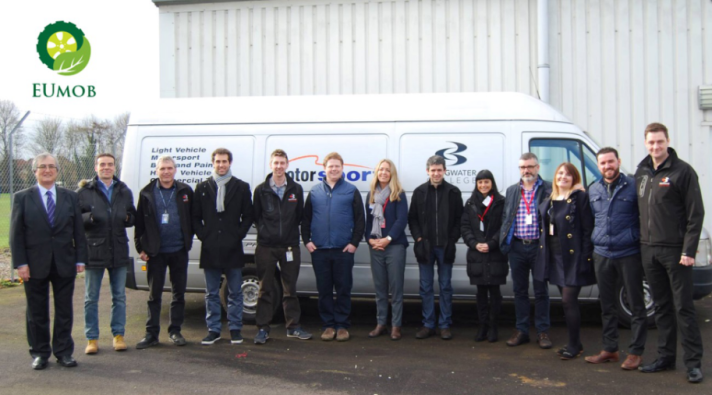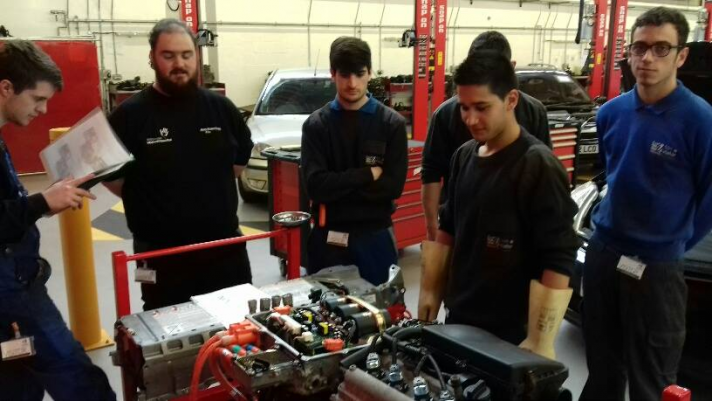Topic(s) addressed
The project aimed to increase the attractiveness of education and training programmes based on ICT methodologies, e-learning, and open educational resources (OER); create awareness among the younger generation and society at large regarding the importance of new efficient and clean mobility systems in urban environments; promote students/staff mobility; provide comprehensive training for young people in the area of electric urban mobility (with a focus not only on new hybrid and electric engines, but also of their impacts on mobility and society); and, develop suggestions on how to create safe working rules for the industry.
Target groups
The project’s target groups consisted of 16 automotive students who were primarily from Denmark, the UK, and Spain, with training opportunities made available to other European partner schools in the Netherlands, Lithuania, and Estonia. Although the project’s aim was to train 24 students, more than 80 students have since completed training since its implementation. As a result of the project’s implementation, teachers from the automotive sector have been offered knowledge that, prior to the project, was largely inaccessible to them, resulting in an increase in their opportunities for professional development. More than 70 teachers have been trained so far, despite an initial aim of only 6 teachers, with more than 50 partner organisations having been impacted instead of the anticipated 3. The project has also increased awareness among policy makers of electric urban mobility (aligned with the European project and EU values) and the necessity for safety and intervention protocols and hybrid electric cars.
Methodologies
At the time of application, none of the 3 partner schools were in possession of adequate teaching material on hybrid or electric engines or were aware of the importance of new, efficient, and clean mobility systems in urban environments. Teaching materials were developed using the knowledge base of a private research company (Tecnalia), itself having been a fairly complicated process given the need to transform highly technical documents into training material suitable for VET students. As the project’s aim was to reach as many users as possible, this process was carried out using assets from Open Educational Resources. With Tecnalia’s assistance, staff were trained in technologies that were (at the time) still new to the market, or that were still being tested (which included new engines that had just been received). A number of training programmes were developed for professionals (VET trainers, car mechanics, and emergency staff such as fire fighters, police personnel, and ambulance staff) and for trainees (VET students), which included the use of an adapted Dynacar (a powerful road vehicle modelling tool).
Environments
By 2013, the school had already identified a training gap with regard to hybrid cars, and although these cars were becoming increasingly popular, the school was unable to train its students due to a lack of materials on the subject. The EUmob project however resulted in a number of changes to the school’s teaching method with regard to this knowledge gap and in the quality of its trainees. Through collaborative measures with a strategic partner, the project’s three partner schools developed an on-line training programme adapted to VET students that was complemented by a professional simulator (Dynacar). It should be noted that even the methodology of the initial training phase was new to us, and involved students first completing an online module in their home country before traveling to partner country schools for a practical component (later complemented by in-company training). Moreover, all three schools also began training emergency services staff, as they had to first learn how to disconnect the vehicle’s battery prior to carrying out rescue efforts.
Teachers
Staff training produced unforeseen outcomes, such as the development of a small group of automotive teachers who were highly specialised in new mobility systems (trained not only by VET teachers from our school, but also by other institutions and professional mechanics). Moreover, we have assisted regional independent car dealers to form a network for collaboration so as to be able to compete with official car dealers.
Impact
The EUmob project enabled us to develop our own online training material, with the project having been implemented just as we were changing from a “paper-based” model to a “digital” one. The project’s model, which shifted from being teacher-centred to student-centred, positions students as main actors that need to collaborate with their colleagues within the learning environment (ETHAZI). Lastly, the development of online automotive course and resources has since been transferred to other education fields and platforms that are currently being used by the school.
- Reference
- 2014-1-ES01-KA202-003617
- Project locations
- Spain
- Project category
- VET schools
- Project year
- 2021
Stakeholders
Participants
Bridgwater & Taunton College
- Address
- United Kingdom
Fundacion Tecnalia Research & Innovation
- Address
- Spain
Syddansk Erhvervsskole Odense-Vejle
- Address
- Denmark


